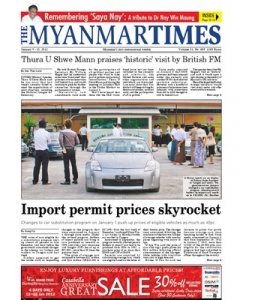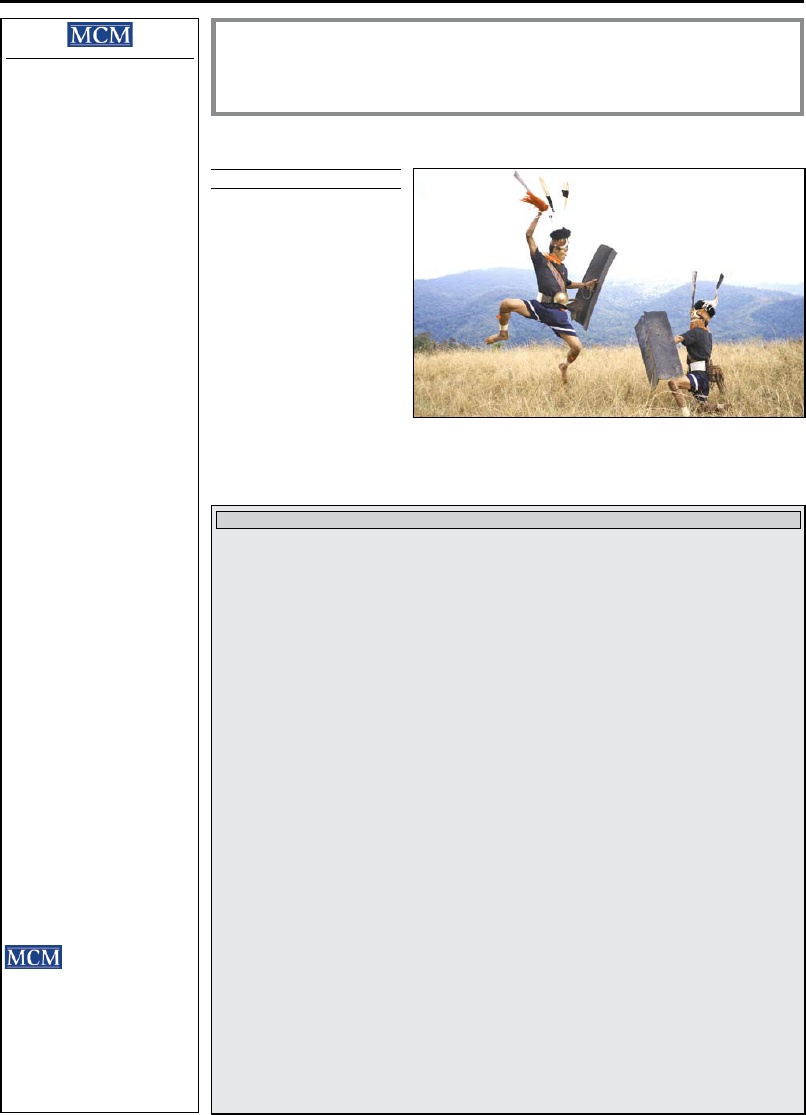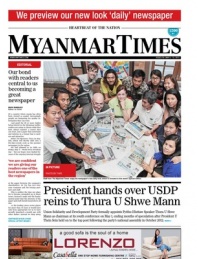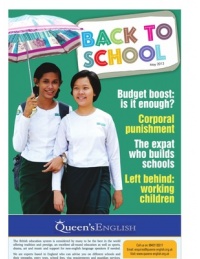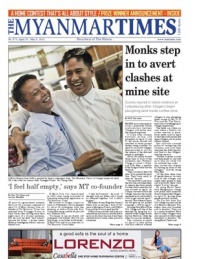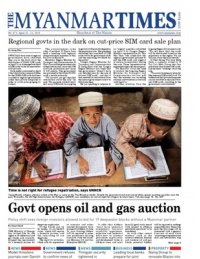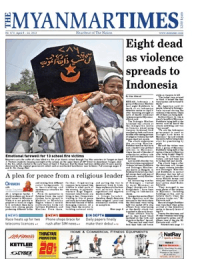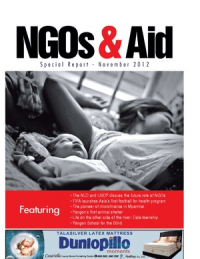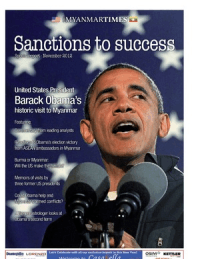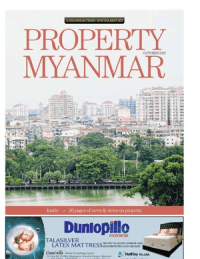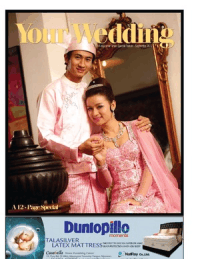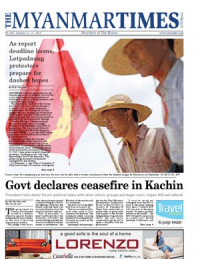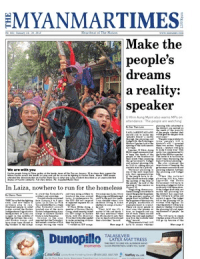myanmar
times
t H e
January 9 - 15, 2012
Myanmar’s first international weekly Volume 31, No. 609 1200 Kyats
By Aung Kyi
THE value of cars eligible fora substitution program shotup almost 40 percent in lateDecember, just days before thegovernment announced changesto the scheme, car brokers andtraders in Yangon said lastweek.Traders appeared to getthe inside word on impendingchanges to the program thatwere announced on January1 through state media. Underthe revised program, holdersof import permits can bring incars produced as recently as2006 and with a cost, insuranceand freight (CIF) fee of up to$62,000 – more than 10 times theprevious limit.“The price of overage carsincreased to between K12 millionand K14 million (US$15,000 to$17,500) from the last week of December,” confirmed U Aye Win,a car broker in Hantharwaddycar market in Yangon. Announced in September, theprogram initially allowed permitholders to import cars had to beproduced from 1995 to 2002, apurchase price of no more than$3500 and CIF of $5500.Permits are acquired bysubstituting overage cars, whichare eligible based on the letter of their licence plate. The changeswere announced following theconclusion of the first two batchesof overage vehicles with numberplates beginning with
salone
to
nga
.U Aye Win said the price of cars with
nagyi
prefix plates hitK14 million following officialannouncement of the changes,while vehicles with
htasinhtoo
were also in high demand.Broker U Tun Oo said theincrease in prices was partlybecause overage cars werebecoming harder to find. Statemedia announced on January 5that from September 19, 2011to January 2, 2012, more than23,000 of the 50,000-plus carseligible for the substitutionprogram had been submitted toDirectorate of Road Transportoffices throughout the country.
Import permit prices skyrocket
A Nissan sports car on displayat Sakura Auto Auctionsin Yangon last week. Thegovernment on Januarychanged a car substitutionprogram, allowing permitholders to import cars worthup to $62,000.
Pic: Boothee
More page 4By Soe Than Lynn
PYITHU Hluttaw SpeakerThura U Shwe Mann saidhe was sorry that lastweek’s amnesty failed tomeet the expectations of most observers, includingthe National League forDemocracy.He told British ForeignSecretary Mr WilliamHague that he understoodsome were “frustrated” thatprisoners of conscience werestill behind bars and wouldcontinue to push for furtheramnesties through theparliamentary system.“Necessary lawamendments were madefor the participation of all political parties andpeople who want to takepart in politics and nationalreconciliation,” Thura UShwe Mann said during themeeting at Zabuthiri Hallin the Pyithu Hluttaw onJanuary 5.“But I have heard thatthose who the NLD wantsfreed have not yet beenincluded in the amnestyand, similarly, theUnited Nations and someother organisations andindividuals are frustrated.I am sorry about that. Ourhluttaw will keep striving fordemocratic process, nationalunity and the participationof all in politics.”State media reportedon January 6 that 6656prisoners had been releasedunder the amnesty andanother 68,964 had receivedsentence reductions.However, only a handful of prisoners of conscience werereleased, with somewherefrom 500 to 1500 thought tostill be behind bars.The speaker described MrHague’s visit as “historic”and said it would open anew chapter in the history of Myanmar-UK relations.He said he hoped the Britishforeign secretary wouldview every sector and offerconstructive comments.
Thura U Shwe Mann praises ‘historic’ visit by British FM
More page 4
Changes to car substitution program on January 1 push up prices o eligible vehicles as much as 40pc
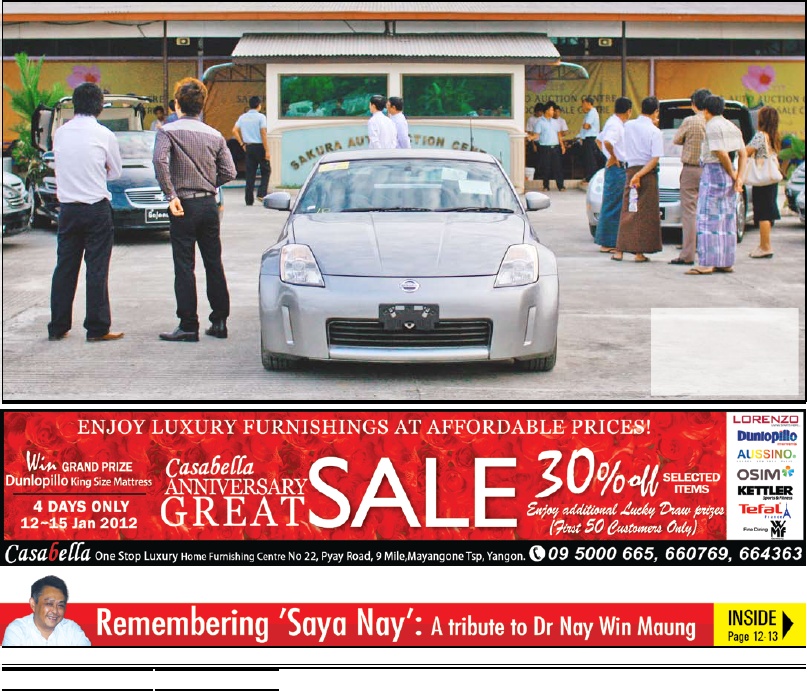





C
omment
the
M
yanMar
t
iMes
2
January 9 - 15, 2012
By Lian Kual Sang
MANY of us regularly saythat there should be unityin our country, arguing thatbecause of a lack of unity wehave conflict and tension.But sometimes I wonder if people really understandwhat they are saying. I sensethat when many of us talkabout unity, ironically whatthey mean is uniformity. Thetwo are in fact very differentin meaning.In my view, uniformityrepresents the past:dictatorship, societalrestrictions and a lack of democracy. It does notaccommodate differences inideas, beliefs, shapes andcolors. Instead, it seeks toeliminate all differences,creating a “one size fits all”society. A system of uniformityrelies on force to bring aboutchange or to achieve certainobjectives. In extreme casesthis means using violenceto reach a particular goal.One aspect of uniformity isdemanding another partychange, or conform, in orderto achieve agreement, peaceor prosperity. Uniformitydoes not allow for negotiationor compromise.In contrast, unity valuesdifferences. It acknowledgesthat people have differentreligions, cultures andpolitical views. It sends themessage that although wemay be different in many wayswe can work and live togetherin a way that benefits both of us. Genuine unity is basedon democratic values, openmindedness and the conceptof multiculturalism. Unityis a nurturing environmentwhere all live side by sideharmoniously based on theprinciples of equality andmutual respect.It is natural that we easilybond with people from similarbackgrounds. Often we arereluctant to associate or workwith people from very differentbackgrounds to our own. Thiscan lead to a situation wherewe even become unaware of what is happening in othercommunities and regionsof the country. As a result,we grow suspicious of thosepeople or groups, fosteringmisunderstanding, hatredand conflict.Unity cannot be achievedunless we discard our oldtendency to seek or enforceuniformity. This applies tofamily units, communities,organisations and the countryas a whole. Some may suggestthat if we all have the samevalues, culture and ethnicbackground there will be noconflict. This may in somecases be true. However, wecannot ignore the reality thatin our country we do not allshare the same values, wedo not follow a single religionand we are descended fromvarious races and ethnicgroups. To enjoy peace,prosperity and democracy,we must first acknowledgethat we are not all thesame. We can then striveto develop unity throughmutual respect and tolerancefor our differences. One wayto achieve unity is throughinteracting with people of different backgrounds fromour own. Through this we canunderstand and respect eachother’s cultures. Gradually,we will begin to understandthe joys, hardships andgrievances of others.For me, living in a uniformsociety would be rather dull. Ifor one will always choose tolive among people of differingsocial systems, with varyingpolitical views and religiousaffiliations. This sort of environment is exciting,rewarding and enriching.But changing the way wethink, behave and interactwith others is not an easyundertaking. It requires asubstantive shift in the waywe think. It requires us toquestion ourselves. It requiresus to be more aware of oursurroundings. It requires usto be brave enough to minglewith unfamiliar groups andexplore new areas. So the nexttime we say the word “unity”,let’s think first whether wereally mean it or not.(
An ethnic Chin, Lian KualSang is a business consultantand entrepreneur fromYangon. He has studied in Australia and the Philippinesand can be reached atnaolian@gmail.com.
)
Unity vs uniformity:which do you mean?
POLITICALLY speaking,it has been a refreshingand uplifting year for thisregion. Indeed, it is hard toknow where to start whenrecapping the good tidingsthat have come our way overthe past 12 months.The standout has beenMyanmar, which, at thestart of the year, continuedto cause hand-wringingand teeth-gnashing inplaces like Washington,Paris and London, whereleaders are always honestand incorruptible.They were chagrinedbecause the multi-partypolls, held in Myanmar theprevious November, hadresulted in the election of a government dominatedby former military officersand their allies. So, ledby Britain and the UnitedStates, they concluded – andtheir conclusion is alwaysdefinitive and sacrosanct– that little had changedand that Myanmar mustcontinue to be ostracisedand vilified.But wait! Suddenlysomething stirred on thewatchtower. There wasmovement. Slow andcautious at first, it suddenlyaccelerated and becameso broad and substantivethat no one, not even thehypocritical miquetoasts inthe US and Europe, couldfail to applaud and makereciprocal gestures.Of course, it remainsto be seen whether theWest’s belatedly grovellingovertures to Myanmar aregenuine, or whether, as sooften in the past, they will beaborted for domestic politicalreasons. For the moment,however, let us rejoicethat Myanmar now hosts avibrant political opposition,a relatively free press thatshames sycophantic editorselsewhere in the region,and is already a powerfulmagnet for investors.There were also other,almost equally uplifting,revelations over the pastyear. In Singapore, thatbastion of disciplineddemocracy, that clockworkisle set in a sea of laxity,that demi-paradise growingupon Cambodian sand, therewas another revolution of sorts.In the May generalelection, the previouslyunassailable People’s Action Party (PAP) lost 40percent of the vote, and theopposition grabbed a keyfive-member seat and thehairless scalp of ForeignMinister George Yeo. Inthe aftermath, the geriatricwarhorse Lee Kuan Yewand the former PrimeMinister Goh Chok Tongboth quit the cabinet, whileothers were dropped. It wasa welcome development,except perhaps in theelite, cloistered corridorsof the PAP. Now, at last,democracy threatens toengulf Singapore and that isa reason to celebrate.So, too, was the mid-yearelection result in Thailand,where a regime of dubiouslegitimacy, helmed by themisnamed Democrat Party,was booted from office.In came a new governmentled by Prime Minister Yingluck Shinawatra, theyounger sister of former PMThaksin Shinawatra, whowas deposed in a shamefulmilitary coup in 2006. Thusfar, Yingluck’s team, despitea predictable barrage of criticism from the localEnglish-language media,has performed credibly.In Malaysia, while PrimeMinister Najib Razak hassolidified his position inthe ruling National Frontcoalition, he has faced heavycriticism, most recently overa new law curbing the scopeof public demonstrations. As well, the protractedshenanigans involved in thecourt case against formerDPM Anwar Ibrahim hasbruised Najib’s reformistimage, but they are unlikelyto dent his re-electionprospects later next year. Another notable highlightof 2011 was PhilippinePresident Benigno Aquinofinally biting the bulletand arresting his venal,but powerfully-connectedpredecessor, formerPresident Gloria Macapagal- Arroyo.
An uplifting year to the end
A NEW year beckons butas we enter the first weeksof 2012, many of the oldchallenges remain. Tacklingthese problems – political,economic and social – willrequire vision, courage anddetermination.But it will also requirethe free flow of constructivedebate. In last week’seditorial, we pledged to do“our utmost to facilitatedialogue and informationsharing among all groups”. Inthat case we were referringto the reconciliation process,which remains in its infancy.However, the statementapplies equally to the manyother unresolved issues thatdefine modern Myanmar,from corruption to prisonersof conscience, nascenteconomic reform to nationalidentity.In recent months we haveexperimented with opinionpieces on land rights, pressfreedom, politics and legalreform. We believe that,after many years of strictcensorship, it is now possibleto express constructive andreasonable opinions on theissues that matter. As a result, this week’sedition of
The MyanmarTimes
includes a “comment”page for the first time inour 12-year history. Wehope to make this sectiona permanent fixture of ournewspaper. Along withregular columns from ourregional correspondent, RogerMitton, it will feature analysisand opinion pieces from arange of commentators, bothlocal and foreign. We will alsoinclude regular editorials andletters to the editor.We hope it becomes a placeof vibrant debate where allkinds of views – includingthose not shared by
The Myanmar Times
– can beaired. But for this to workwe need your help. Withoutcontributions from readers,the usefulness of this sectionwill be limited. If you’ve gotsomething important to say,whether it’s about an articlewe’ve published or not, wewant to hear it. You cancontact us through the postaland email addresses andtelephone numbers below.
Address:
379-383, Bo AungKyaw Street, Kyauktadatownship, Yangon
Telephone:
(+951) 392-928, 253-642
Fax:
(+951) 392-706
Email:
your.myanmar.times@gmail.com
Make sure your voice is heard
Daw Aung San Suu Kyi meets Pyithu Hluttaw Speaker Thura U Shwe Mann in Nay Pyi Taw on December 23.
Pic: AFP
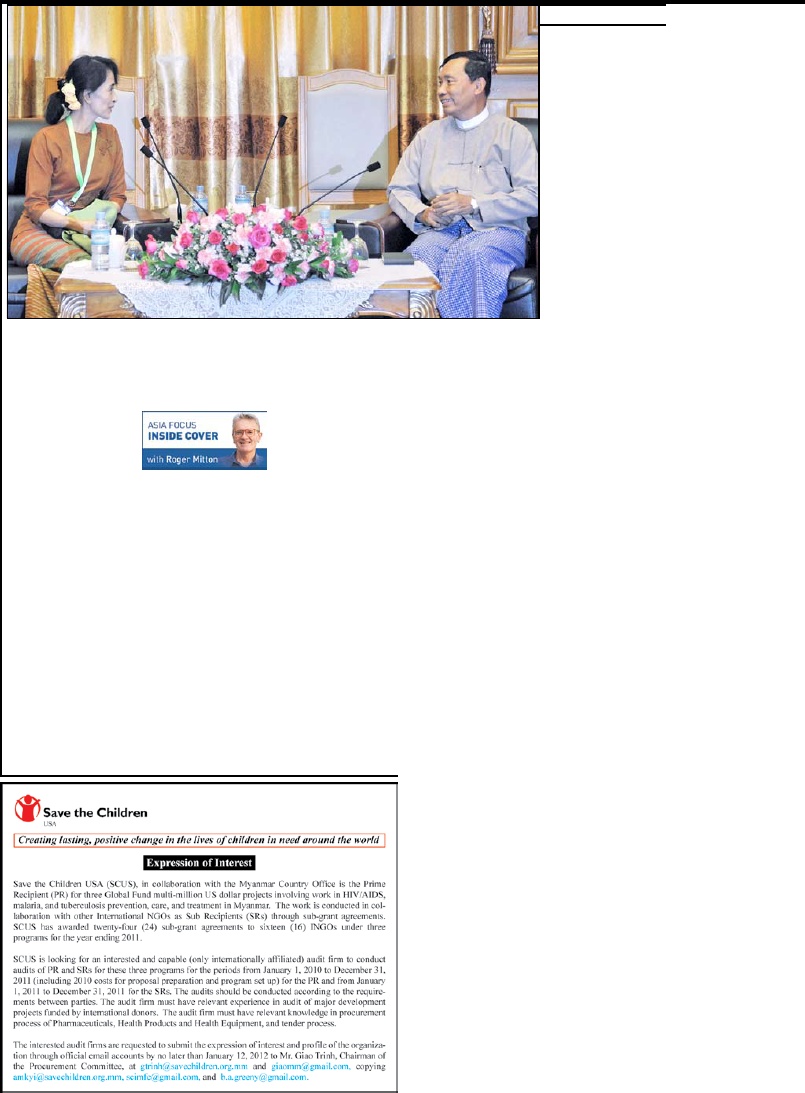



n
ews
3
the
M
yanMar
t
iMes
January 9 - 15, 2012
NAY PYI TAW – USbillionaire investor GeorgeSoros said he has agreed toset up an official base forhis philanthropic work aftermeetings with President UThein Sein and Daw AungSan Suu Kyi.One of the world’s richestmen, the financier fundspro-democracy initiatives inMyanmar and visited fromDecember 26 to January3 “in his capacity as aphilanthropist”, a statementseen on January 5 said.Mr Soros said he plannedto establish an “officialpresence” in the countryto aid “the transition froma closed to a more opensociety”.He added that talks withDaw Aung San Suu Kyiincluded “a wide rangingdiscussion about the reformprocess”.“My foundations have beensupporting the democracymovement for 20 years, butthis was my first meetingwith Daw Aung San SuuKyi. I have been and remainvery much guided by hervision in my involvement inBurma,” Mr Soros said.“While I am greatlyencouraged by signs of political opening in Burma,the reforms are in earlydays. There is a big gapbetween the good will at thetop and conditions on theground,” Mr Soros said, inthe release from his OpenSociety Foundations group.Mr Soros, who made a hugefortune from speculating, hasgiven away billions of dollarsto philanthropic causes inrecent years.Formerly known as theOpen Society Institute, hisOpen Society Foundationshave funded a numberof projects in Myanmarsince 1994, with a focus onincreasing internationalawareness of conditions inthe country and providingassistance to marginalisedethnic minorities, women,and young people.
– AFP
Soros toopen aidoffice inMyanmar
By Yadana Htun
BRITISH Foreign Secretary WilliamHague urged the governmentto release all political prisonersimmediately at the end of hishistoric two-day visit last week. At a press conference at theBritish Council on January 6,Mr Hague told reporters that thegovernment also needed to takebolder steps on a number of otherissues, including political dialoguewith armed ethnic groups andhumanitarian access to areasaffected by conflict.He said though that he thoughthe government was moving inthe right direction and had beenencouraged to hear it plannedto release all remaining politicalprisoners.“All the ministers reaffirmed theirpolicy on the release of politicalprisoners. I urged them to do soquickly. It is important to proceedwithout delay,” Mr Hague said.“Many hundreds of men andwomen still remain in jail here fortheir beliefs. This has no place inany democracy, and it has no placein the future of this country. Moreambitious action will be needed andwe look to them to rapidly honourthis commitment,” he said.During his January 5-6 trip, MrHague met government officials inNay Pyi Taw, including PresidentU Thein Sein, Foreign Minister UWanna Maung Lwin and PyithuHluttaw Speaker Thura U ShweManm. In Yangon, he met Daw Aung San Suu Kyi and other seniorNLD members, ethnic leaders andformer political prisoners.He said European Union wouldhold its annual meeting in early April and would consider respondingto progress in Myanmar.“We are ready to move towardsa strong, positive and openrelationship as reforms take place,and to respond bilaterally andthrough the EU. We will judgethe progress by actions and eventsand will respond in good faith tomeasures as they are taken,” hesaid.Following her meeting withMr Hague on January 6, Daw Aung San Suu Kyi agreed thegovernment needed to focus on theaddressing the issues he outlined,including the need for free and fairby-elections.“All political prisoners should bereleased and there should be allefforts made to put an end to allethnic conflict within our country.Certainly we would want to see freeand fair by-elections,” she said. At the joint press briefing at Daw Aung San Suu Kyi’s residence,Mr Hague said the lifting of EUsanction on Myanmar woulddepend on progress of the issuesthat concerned the internationalcommunity. He added that it was“very important that we do notrelax the pressures prematurely”.It was Mr Hague’s first visitand the first by a British foreignsecretary since 1955.
Free prisoners ‘withoutdelay’, Hague urges govt
British Foreign Secretary William Hague shakes hands with President U Thein Sein during a meeting at thepresident’s residence in Nay Pyi Taw on January 5.
Pic: AFP
By Geoffrey Goddard
SOME of the most prominent namesin corporate America plan to travel toMyanmar late this month for a six-day visit being organised by a leadingUnited States’ lobby group, BusinessExecutives for National Security.The founding chairman of BENS,Mr Stanley Weiss, will lead thegroup of about 14 present or formerleaders of some of the best-knownUS corporations during the visit,which is due to begin on January 31,a spokesperson told
The MyanmarTimes
last week.The group is expected to make acourtesy call on President U TheinSein in Nay Pyi Taw on February 3,said the spokesperson, who requestedanonymity. A lavish itinerary has been preparedfor the visit, with the group travellingby private plane and staying inluxury hotels at Bagan, Putao, InleLake and Yangon.The itinerary includes a hot-airballoon trip at Bagan and sight-seeing tours from Putao in four-wheel drive vehicles and by privatehelicopter. A dinner is also being arranged atThe Strand hotel on February 4 toenable members of the BENS groupto meet leading members of thecommunity.Mr Weiss, the former chairmanof American Premier, a mining,chemicals and mineral processingcompany, founded BENS in 1982.His website says the group is anon-partisan organisation of seniorexecutives who use the best practicesof business to strengthen US nationalsecurity.Mr Weiss has written widely onpublic policy issues in a numberof publications including the
International
Herald Tribune, The New York Times, The Wall Street Journal
and
The Washington Post.
In an opinion piece published inthe
International Herald Tribune
on February 20, 2009, Mr Weisscriticised the imposition of sanctionson Myanmar by the US.“Sanctioning Myanmar may make Americans feel good, but feeling goodand doing good are not the same,” hewrote. “If the US intent is to improvepeople’s lives in Myanmar, it mustfind a new way forward.”
US corporatehigh-flyersplan visit forlate January
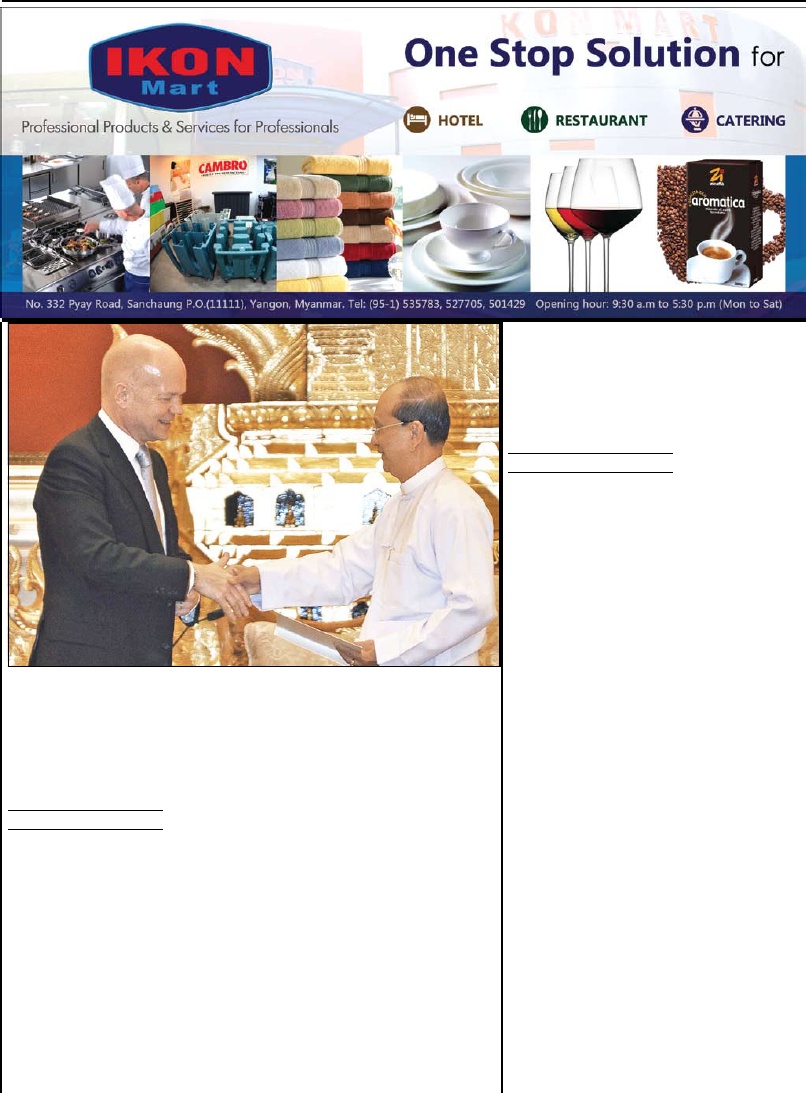



検索履歴:
結果00中00
00結果次の結果
p.
Notes
Post Note
